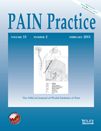The Use of a Continuous Brachial Plexus Catheter to Facilitate Inpatient Rehabilitation in a Pediatric Patient with Refractory Upper Extremity Complex Regional Pain Syndrome
Abstract
Background: The goal of interventional management of refractory pediatric complex regional pain syndrome is to facilitate early restoration of function to the affected extremity. These interventions are more complicated in children, as most do not tolerate these procedures without sedation.
Case report: We report the first detailed description of a pediatric patient with complex regional pain syndrome refractory to medical management who had complete resolution of symptoms after brief inpatient rehabilitation involving continuous brachial plexus blockade and a multidisciplinary apaproach.
Conclusion: Repeated interventional therapy for refractory, severe complex regional pain syndrome may not be feasible in children owing to the requirement for deep sedation or general anesthesia. A multidisciplinary apaproach of brief inpatient rehabilitation and continuous blockade via an indwelling pain catheter may provide a safer, more cost-effective means of restoring function in children with advanced disease.




